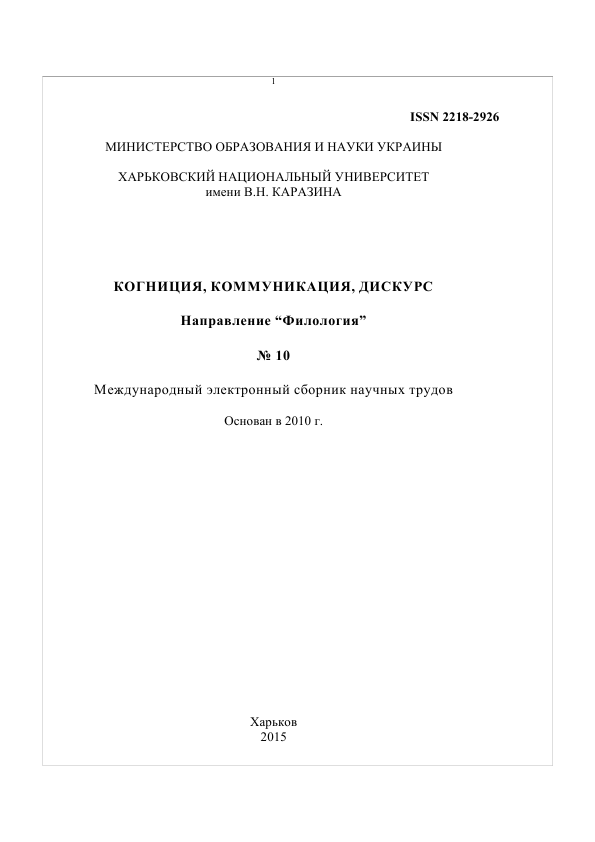Irony in Ch. Darwin’s works: a complex approach
Abstract
The article attempts at a complex approach to irony in scientific discourse by Ch. Darwin through combining three perspectives of irony studies: interpretational, communicative and linguistic stylistic proper. The object of consideration is Ch. Darwin’s texts as suggested by the popularity of the world view created by the scientist, a great variety of genres and the brilliant English language of his works. Irony in his books is created by a number of means and models: stylistically marked vocabulary, metaphors, comparisons and comparative constructions based on contrast and paradox, picture-sketches, intertextual fragments. The use of interpretational approach reveals both “one-stage” and “two-stage” interpretations of irone. The former is implied by popular fixed images, clichés, and references to other scientists’ opinion using stylistically marked vocabulary. The latter involves inference and picture-sketches. Communicative approach includes several issues: the knowledge of the epoch of text creation, author’s goals of setting respectful and equal relations with his readers. The addressee is regarded as a “non-alien” which corresponds to the means of presenting the material. Darwin’s textual strategy is neither “aggression” nor “defense”, it is rather a “role-play” strategy where roles can be changed within text fragments. The complex approach used in the article allows a concise consideration of author’s linguistic personality and his ways of presenting information.
Downloads
References
Bocharov, A. (1980). Soobshhitel'nost' ironii [Irony informaty]. Voprosy literatury. – Literature Issues, 12, 74-114 (in Russian)
Colston, H.L. (2007). A Brief History of Irony Irony in Language and Thought. H.L. Colston and R.W. Gibbs (eds.). A Cognitive Science Reader. New York, London: Lawrence Erlbaum Associates, pp. 3-24.
Darwin, Ch. (2015). Complete Works Complete Works – Darwin On-Line. Available at: http://darwin-online.org.uk/. (Accessed 27 March 2015)
Giora, R. (1998). Irony: Graded Salience and Indirect Negation. Metaphor and Symbol ,13 (2), 83-101.
Hutcheon, L. (2005). Irony’s Edge. The Theory and Politics of Irony. New York: Routledge Publ.
Literaturnaja jenciklopedija. Ironija [Literature Encyclopedia]. Available at: http://dic.academic.ru/dic.nsf/enc_literature/2097/ (Accessed 2 April 2015)
Mandel'shtam, O.Je. (1932). K probleme nauchnogo stilja Darvina [On scientific Darwin’s style]. Available at: http://www.rvb.ru/mandelstam/01text/vol_3/03prose/3_247.htm(Accessed 30 March 2015)
Pohodnja, S. I. (1989) Jazykovye vidy i sredstva realizacii ironii [Linguistic means and ways of irony realization] Kyev: Nauk. dumka Publ.
Rozental', D.Je., Telenkova, M.A. (1985). Slovar' – spravochnik lingvisticheskih terminov [Dictionary of linguistic terms]. Moscow: Prosveshhenie Publ.
Searle, J. (1979). Expression and Meaning. Cambridge: Cambridge University Press.
Shilihina, K. M. (2008). Intertekst kak sredstvo sozdanija ironii [Intertext as the means of irony creation]. Vestnik VGU. Serija «Lingvistika i mezhkul'turnaja kommunikacija». – VGU Newsletter. Linguistics and International Communication, 3, 152 – 157 (in Russian)
Shilihina, K. M. (2008). Sovremennye teorii verbal'noj ironii: osnovnye problem [Modern verbal irony theories] Jazyk, kommunikacija i social'naja sreda. – Language, Communication, Social Environment, 24 – 32 (in Russian)
Shishkina, T.A. (1990). Pragmatika ironii [Irony pragmatics]. Logiko-semanticheskie i pragmaticheskie problemy teksta. – Logic Semantical and Pragmatic Problems of the Text, 83-90. (in Russian)
Wilson, D. (2007). On Verbal Irony. H. L. Colston & R. W. Gibbs (Eds.). Irony in Language and Thought. A Cognitive Science Reader. New York, London: Lawrence Erlbaum Associates, pp.35-56.
Authors, who publish with this journal, accept the following conditions:
The authors reserve the copyright of their work and transfer to the journal the right of the first publication of this work under the terms of the Creative Commons Attribution License (CC BY), which allows other persons to freely distribute a published work with mandatory reference to the authors of the original work and the first publication of the work in this journal.
Authors have the right to enter into separate additional agreements for the non-exclusive dissemination of the work in the form in which it was published by this journal (for example, to post the work in the electronic institutions' repository or to publish as part of a monograph), provided that the link to the first publication of the work in this journal is given.
The journal policy allows and encourages the authors to place the manuscripts on the Internet (for example, in the institutions' repositories or on personal websites), both before the presentation of this manuscript to the editorial board and during review procedure, as it contributes to the creation of productive scientific discussion and positively affects the efficiency and dynamics of citing the published work (see The Effect of Open Access).




